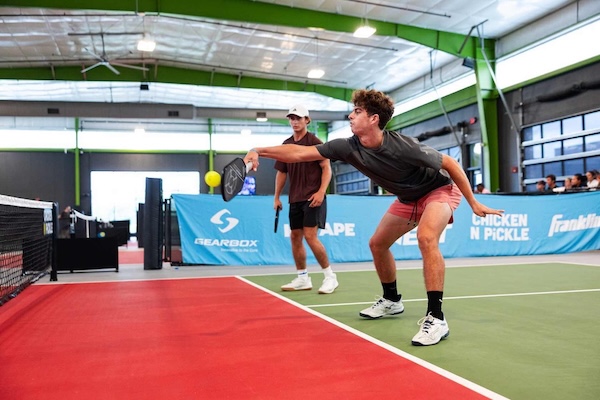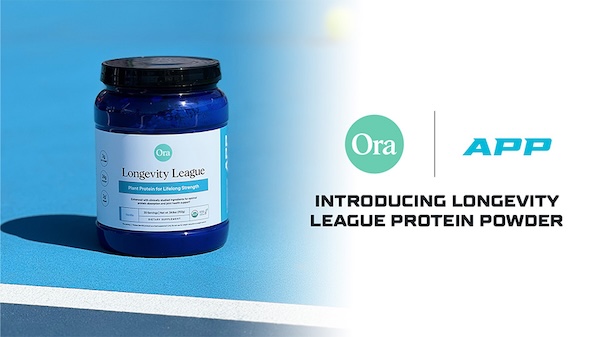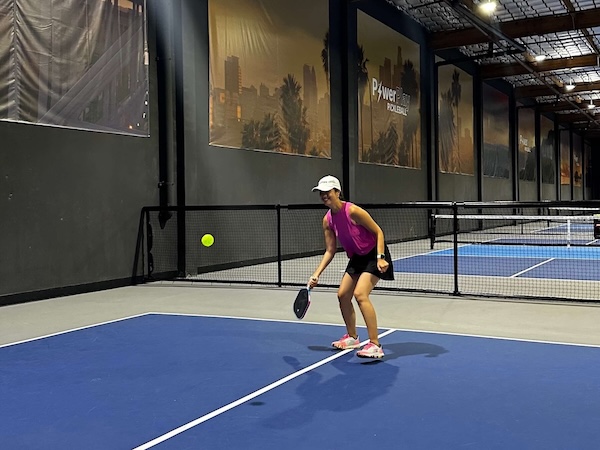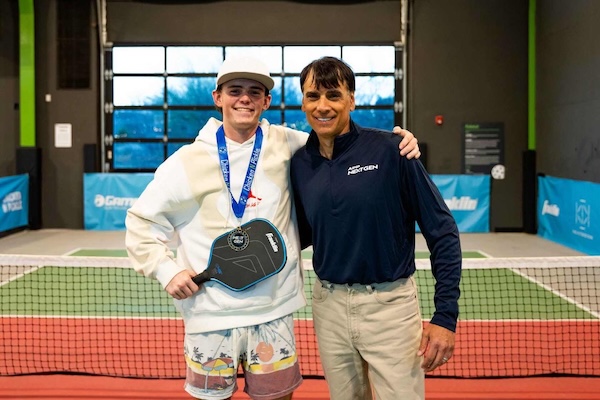*Warning: Graphic Content
It’s 2:00 in the morning on a summer night in 2022 and, like clockwork, Rob Nunnery is on all fours on the bathroom floor of his air condition-less Hawaii apartment trying to manually drain the fluid from the abscesses in his buttocks. This was an unfortunate nightly occurrence for far too long as he struggled to understand what was happening to his body, and with little help.
It was April of 2022 when Nunnery first noticed something was wrong. He was in Utah for a pickleball tournament when he felt a flash of aching pain around his buttocks before going to sleep one night. The first time the pain disappeared by morning, but after playing the tournament and flying back to Hawaii, where he lived and worked at the time, the pain returned.
“I would say at that time it was a pretty sharp pain around my butt. But it felt like it was internal, it didn't feel like there was anything external that I could do about it,” recalls Nunnery. “It got to the point where the pain was so bad that I went to urgent care, and they thought it was some kind of cyst but they referred me to a general surgeon.”
That day Nunnery went from urgent care to the general surgeon, to the emergency room, to imaging, and ultimately back to the general surgeon. They had spotted something on the imaging results but weren’t sure exactly what. The surgeon suggested an incision and drainage procedure with the goal of relieving the pressure and pain. The problem was, he didn’t know exactly where to make the incision, so after a survey of the area and asking Nunnery which pressure points elicited pain, he made his first attempt.
“He created this incision and to this day, it’s probably the worst pain I’ve ever felt because I felt the actual incision,” Nunnery describes in detail. “I don’t know what’s happening but the local anesthetic must not have worked because I feel everything after he made the incision, and he was like ‘welp, yeah, nothing there, nothing in that one.’ And I’m dying.”
Fortunately, the subsequent anesthetic and incision did prove productive, and Nunnery was sent home hoping he had fixed the issue. For a couple of days Nunnery had relief, but eventually the unbearable pain would return. The surgeon recommended warm sitz baths to help with the drainage, but Nunnery got to the point where he wasn’t able to go about simple daily tasks.
“I had a full-time job and I couldn’t leave the house,” Nunnery concedes. “It was really, really bad.”
In May of 2022, Nunnery was booked into a special event and an APP tournament in New York City - two things he absolutely didn’t want to miss. At this time, he wasn’t going anywhere without his doughnut pillow, and he was on antibiotics while going to the surgeon regularly to get his abscesses drained. The travel time from Hawaii to New York City is enough to make a healthy person cringe, and for Nunnery, it meant having to manually drain himself in the airport bathroom before his flight and during his layover. While in New York, he made warm compresses using rags and tea kettle water from the hotel, which aided his draining process.
During the APP tournament, Nunnery distinctly remembers playing a tight, three-game match on mixed doubles day.
“I just remember that day I’m running to the bathroom in between matches just squeezing as hard as I can to try to get it to drain, and I’m on an absurd amount of ibuprofen every day. I think I was maxing out what I should take in addition to maxing out Tylenol,” Nunnery chronicles. “It was helping me at least get through.”
At the end of that day, Nunnery was stretching out his legs on the court after his last match. As he was coming up from a squat, he felt a pop in his left knee.
“I knew it just didn’t feel right,” says Nunnery. “I could actually see something sticking out of my knee - it didn’t look like my other knee.”
As it turns out, some of the side effects of the antibiotic Nunnery was taking at the time, include weakness of bones, joints and ligaments. So when Nunnery felt the pop in his knee, he had just torn his meniscus. He could barely walk.
Shortly after that he flew to Austin and was hoping to find some better healthcare than he had in Hawaii. The good news was, he found it. The bad news was, they couldn’t operate on his knee until whatever was going on in his buttocks was cleared. He was able to finally see a colorectal surgeon in Austin, who told him he had a complex horseshoe perianal abscess and fistula. A fix, Nunnery was advised, was to have seton drains inserted into the fistulas so that the infection could drain through.
Three seton drains were surgically implanted, and a week later, Nunnery had his torn meniscus repaired. He then returned to Hawaii.
While the seton drains were helping, the infection still wasn’t draining fully and there was still a significant amount of pain. The doctors had warned him that while a good first step, it was still not the end.
“What was happening when I was back in Hawaii was just this insane amount of fatigue and nausea and inability to leave my apartment,” Nunnery explains. “That time when I went back to Hawaii was probably the darkest time. Even post-surgery I was in so much pain but it wasn’t acute like before, where the abscesses were. This was more of a really, really deep internal not-stopping pain that wouldn’t let me leave home.”
For the remainder of 2022, still in pain and without an official diagnosis, Nunnery survived on ibuprofen and continued to play in pickleball tournaments. Wanting to move to pickleball full-time, he moved back to the mainland at the beginning of 2023, and immediately began to look for long-term solutions for his health issues.
In between tournaments in Florida, Nunnery was able to see GI and colorectal specialists at the Mayo Clinic in Jacksonville. After a couple months of exploratory procedures which revealed severe stomach ulcers in the terminal ileum, in May of 2023, more than a year after his pain began, Nunnery was finally diagnosed with perianal Crohn’s disease.
While there is no cure for Crohn’s disease, there are ways to manage its impact. Nunnery had another colorectal surgery in May of 2023 to insert a fourth seton drain, after which he started the medication Remicade, which is a drug that is infused intravenously, as well as azathioprine, an immunosuppressant which can help reduce inflammation. Both of these drugs together are the typically the most effective in the battle against Crohn’s.
The New York City APP event took place at the end of May, 2023, and Malan Doty, Nunnery’s partner, remembers that event well.
“He was pretty sick that entire time,” Doty clarifies about Nunnery, who won gold in mixed pro doubles with Susannah Barr, and gold in men’s pro doubles with Andrei Daescu. “People see that he won double gold, but behind the scenes he was waking up in full sweats, and had a fever, but just kind of soldiered on.”
By the end of 2023, while the medication had helped in reducing the ulcers, the colorectal pain was still present. After relying so heavily on ibuprofen in the past, it was now forbidden due to the havoc it was confirmed to wreak on Nunnery’s stomach. So another colorectal surgery was done to remove and reposition some of the seton drains, and medication was increased to every four weeks instead of every eight.
The mental toll of his health issues were finally taking a toll on Nunnery, and in January he reached a low point and had a break down.
“I feel broken. I just hit absolute overwhelm,” admits Nunnery, who had a very public divorce in 2023 that added to his emotional stress. “I don’t know when I’m ever going to feel better. It’s so exhausting dealing with this all the time, but also trying to play and practice and do this at a high level, and what do I do if I’m not able to play? How am I going to make money?”
Nunnery started seeing a therapist and is now taking an antidepressant, which has helped stabilize the lows. All things considered, he feels as though he’s trending in the right direction despite tearing his right meniscus at the APP Punta Gorda Open in January of this year. He was sidelined until Delray Beach, but has decided to take cortisone shots until this summer when there’s a bit of a break in the APP schedule and he can have surgery.

“I'm not always good about talking about how much pain I'm in, I just kind of white knuckle through and have been for the past couple years,” confesses Nunnery, who has benefitted from Doty advocating on his behalf. “You become so accustomed to how you feel that you don't realize necessarily that it's not normal, and not very okay to always be in pain just sitting there, right? Every day I’m at a baseline, six out of 10 of pain, and not going below that.”
The gauze and pads that catch the drainage from the seton drains obviously have to be changed regularly each day, which is now a normal part of life for Nunnery. He is also currently on Gabapentin which is supposed to help with pain management. To a casual observer, though, none of this is apparent.
Those watching the 2024 APP Vlasic Classic - Cincinnati just last week would have had no idea that Nunnery was battling through this debilitating disease, and, as Doty testifies, wasn’t feeling well prior to his gold medal match on Championship Sunday. After winning a bronze medal in mixed pro doubles - an event he knows is not his best - with Megan Fudge on Friday, Nunnery and men’s pro doubles partner, Ryler DeHeart, captured the gold on Sunday. The gold was the first for each in 2024 and the first ever for DeHeart.

“I had played with Ryler some and I knew he had never gotten a gold medal and I was super motivated to help him do that,” Nunnery insists. “It was such a good feeling to get through it, it was probably my most proud moment of pickleball, honestly. We didn’t have these unbelievable underdog wins that we shouldn’t have won, but it wasn’t so much about that. It was more about just everything I’ve been through over the past couple of years. And doing it with Ryler was super special, that being his first, and he was so happy and so grateful. It was just really special.”
The month of May is already significant to Nunnery. His birthday is May 14th and he just turned 39. He was diagnosed with perianal Crohn’s disease in May of 2023, so this month marks his one year anniversary. May 19th is also World IBD Day, which seeks to raise awareness for Crohn’s disease and ulcerative colitis, known as inflammatory bowel diseases.
“To me, it's just sharing what I'm going through to help anybody else that's going through something similar, whether it's Crohn's, or whether it's something completely different. I think everybody has their own struggle, and I think unless you share it, nobody can really connect with it or relate to it,” Nunnery discloses. “It’s just kind of in my nature to like being open about what's going on my life, and I think while I have shared I don't think I've been incredibly, incredibly vocal because I don't want it to feel like I'm looking for sympathy or like I want people to feel bad for me. I don't whatsoever. I don't necessarily like talking about it. But I do want people to know that it's chronic pain, and if you have chronic pain, it's so hard to get through and easier to get through if you feel like you're not alone. So that's my hope.”
Having to manage perianal Crohn’s disease means that there are many uncertainties ahead for Nunnery with regard to treatments, medication, pain management, and the list goes on. He does, however, want to play pickleball as long as his body will allow him, not just because he loves the game and the competition but because of the benefits to his mental health.
In 2023, Nunnery won 17 APP Tour medals - nine gold, five silver, and three bronze. In three tournaments so far in 2024, he has three medals, one of each color. So while it’s understandable that there are days when he feels like he’s losing the battles, one thing is glaringly obvious.
Rob Nunnery is winning the war.












